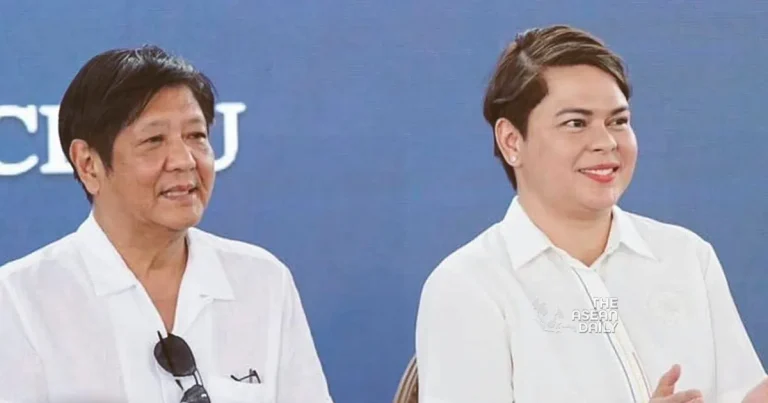1-12-2023 (MANILA) The unity between Philippine President Ferdinand Marcos Jr and Vice-President Sara Duterte appears to be on shaky ground, as recent power struggles suggest a growing rift between the two influential figures.
In what was touted as a historic victory during the May 2022 elections, the second year in office for the “UniTeam” has been marked by instability, a stark departure from their initial success as the first president and vice-president tandem to secure a majority vote in four decades.
Tensions escalated in November, as President Marcos and the House of Representatives, under his control, made moves described by political analyst Cleve Arguelles of De La Salle University as an apparent attack on Vice-President Duterte.
Speaker Martin Romualdez, a close confidante and cousin of the president, leads the House, with speculation rife about his presidential ambitions in 2028, mirroring those of Vice-President Duterte.
Arguelles commented, “I definitely think this alliance is already over. For these tensions to be apparent in the public eye, it says a lot about the relationship inside the coalition.”
On November 9, Vice-President Duterte abandoned her bid for 650 million pesos ($15.6 million) worth of confidential funds in 2024, facing criticism over the transfer of 125 million pesos from President Marcos’ office to her office in 2022.
Lawmakers raised concerns about the rapid expenditure of these funds in just 11 days, leading to a Supreme Court case filed by key opposition figures.
Rumors of a potential impeachment plan against Vice-President Duterte circulated in political circles, though President Marcos stated he was monitoring the situation but asserted, “She does not deserve to be impeached.”
Further complicating matters, on November 13, a local court granted bail to former opposition senator Leila de Lima, a significant political figure during the presidency of Rodrigo Duterte, Vice-President Duterte’s father, and President Marcos’ predecessor.
Subsequently, on November 28, the House initiated an investigation into a TV channel owned by Duterte ally Apollo Quiboloy for allegedly spreading misinformation about Speaker Romualdez’s foreign trips.
The following day, two House committees adopted a resolution urging the Marcos government to cooperate with the International Criminal Court’s (ICC) probe into President Duterte’s drug war, signaling a shift in stance from President Marcos, who is now considering resuming the Philippines’ ICC membership.
ISEAS – Yusof Ishak Institute fellow Dr. Aries Arugay noted, “These personal attacks on Sara Duterte, the resolution defending Romualdez, this sudden, newfound courage of the House to criticize Duterte – all these measures disempower the Dutertes.”
Dr. Arugay suggested that Vice-President Duterte’s insistence on rewards for her sacrifices and her perceived asymmetrical power within the coalition may have made her a target for political elites.
Despite these challenges, Vice-President Duterte insisted that there are no cracks in the alliance, a sentiment echoed by President Marcos. However, recent polls indicate a decline in their approval ratings, raising concerns of more political clashes within the Marcos and Duterte factions.
Dr. Arugay warned, “All this tells you that in Philippine politics, political tides can continuously shift. Therefore, you cannot be arrogant. You cannot have hubris. Political karma is a regular thing. There will always be a reckoning.”
As the Philippines approaches the campaign season for the 2025 mid-term elections, the political infighting may intensify, serving as a referendum on the Marcos presidency and shaping the landscape for potential successors in 2028.




